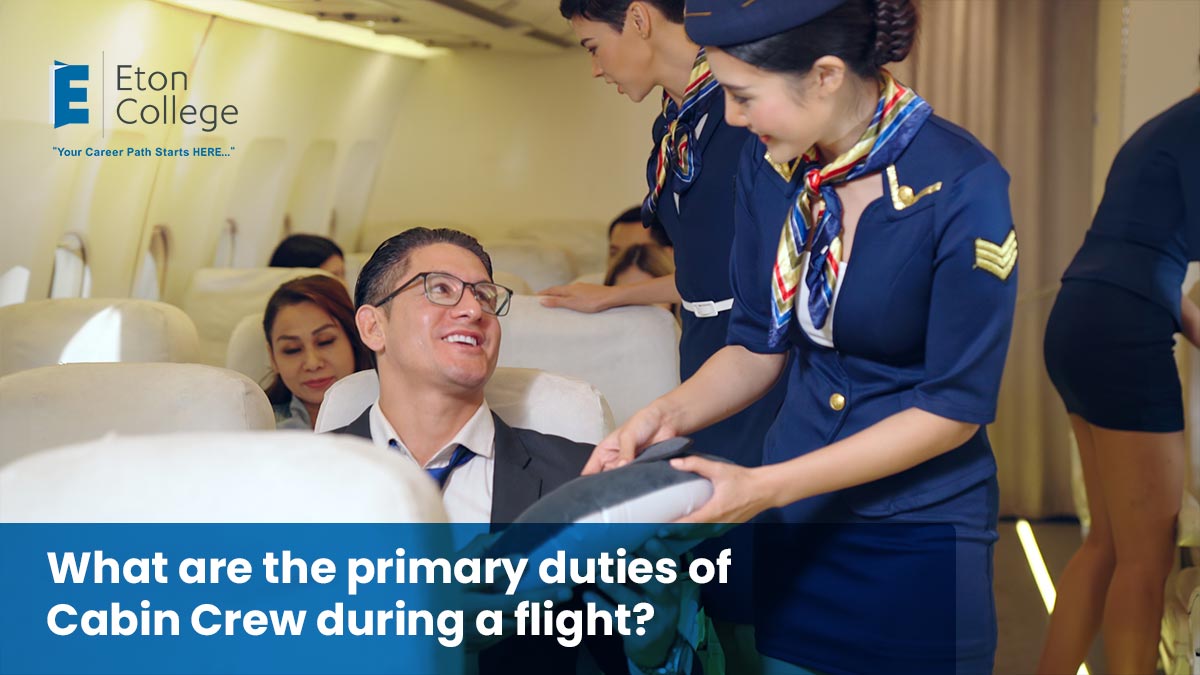Key Takeaways:
- Cabin crew duties involve pre-flight preparation, in-flight safety, exceptional passenger service, and emergency response.
- Cabin crew play a crucial role in maintaining in-flight safety and handling emergency procedures.
- Providing top-notch passenger service is essential to enhancing the travel experience.
- Eton College’s flight attendant program offers practical training that prepares students for both cabin crew and ground operations roles in the aviation industry.
A career as a cabin crew member is more than just flying across the globe—it’s about ensuring the safety and satisfaction of passengers while managing various aspects of flight operations. The responsibilities of cabin crew professionals extend beyond customer service and hospitality, requiring them to master in-flight safety protocols and emergency procedures.
Related:What is a Cabin Crew?
In Canada, the aviation industry is growing, with airlines continually recruiting qualified professionals to meet demand. Cabin crew members are essential in maintaining smooth flight operations and creating a memorable passenger experience. Their roles reflect the delicate balance between safety, service, and operational efficiency, making it a rewarding yet demanding career path.
Pre-Flight Preparations
1. Pre-Flight Duties: Preparation Sets the Tone
Every flight begins with thorough preparation. Cabin crew attend team briefings where they discuss flight specifics, weather conditions, and passenger needs. Reviewing safety equipment and verifying that emergency procedures are in place ensures the aircraft is ready for takeoff. Special attention is given to passengers with unique requirements, such as those with disabilities or unaccompanied minors.
This behind-the-scenes work ensures the team is ready to provide excellent passenger service while keeping operations running smoothly.
2. Ensuring In-Flight Safety: Keeping the Journey Secure
Maintaining in-flight safety is a critical part of cabin crew duties. Before departure, crew members demonstrate the use of safety equipment, such as life vests and oxygen masks, while ensuring passengers follow safety protocols. During the flight, they monitor passengers and manage any risks, such as turbulence or disruptive behavior.
Cabin crew must remain vigilant throughout the journey, ensuring passengers’ safety and well-being while providing reassurance during any disturbances.
Related:Can I Choose A Flexible Schedule For Cabin Crew Training?
3. Delivering Exceptional Passenger Service
Providing excellent passenger service is a core responsibility of the cabin crew. From serving meals and beverages to addressing concerns, their role is to make the flight comfortable and enjoyable. Cabin crew are skilled at managing diverse passenger needs—from calming nervous travelers to assisting families with young children.
This part of the job requires empathy, patience, and strong interpersonal skills. Cabin crew professionals ensure passengers feel valued and cared for throughout the journey.
4. Handling Emergencies: Ready for the Unexpected
A key component of cabin crew duties is being prepared for emergencies. Whether it’s a medical emergency or an aircraft evacuation, crew members are trained to handle high-pressure situations with calm and precision. They follow strict emergency procedures to guide passengers safely, ensuring that the situation is resolved as efficiently as possible.
Their training in first aid and crisis management plays a vital role in keeping passengers safe and minimizing risks during unexpected events.
5. Post-Flight Responsibilities: Wrapping Up Operations
The work doesn’t end when the aircraft lands. After disembarkation, cabin crew inspect the cabin for lost items and ensure all safety equipment remains operational. They also complete reports on any incidents that occurred during the flight, providing feedback to the airline’s operations team.
Post-flight responsibilities may seem like a small part of the job, but they are essential in maintaining the efficiency and safety of future flights.
Related:Work Environment: Flight Attendant vs Cabin Crew vs Ground Crew
How Eton College Can Prepare You for Success in the Aviation Industry
Eton College offers a specialized flight attendant program that equips students with the knowledge and practical experience needed to excel in the aviation industry. This program covers essential areas such as in-flight safety, passenger service, and emergency procedures—all critical components of cabin crew duties.
Students receive hands-on training and practical exposure to airport operations, giving them a head start in their careers. Whether your goal is to work as part of a cabin crew or explore ground staff roles, Eton College’s program prepares you to meet the challenges and opportunities of the aviation job market. With a strong focus on both technical skills and soft skills like communication, the program ensures graduates are well-rounded and job-ready.
A career as a cabin crew member offers exciting opportunities and challenges, requiring a blend of interpersonal, safety, and service skills. From pre-flight preparations to post-flight responsibilities, cabin crew members ensure smooth operations and an exceptional passenger experience. As the aviation industry continues to grow, this profession promises not only aviation opportunities but also a rewarding journey for those passionate about travel and customer care.
Related:What Do Cabin Crews Do During Layovers? What Students in Flight Attendant College Should Know
Eton College’s flight attendant program equips students with the skills, knowledge, and confidence to excel in this competitive field. Whether you aim to pursue a cabin crew career or explore roles in airport operations, Eton’s comprehensive training will prepare you for success in the dynamic aviation job market.
FAQs
- What qualifications do I need to become a cabin crew member?
Most airlines require a high school diploma, proficiency in English, and strong customer service skills. Some airlines also prefer candidates with additional language skills and formal cabin crew training. - How long does it take to complete a flight attendant training program?
The duration varies, but most programs, like Eton College’s, can be completed in a few months. They cover essential topics, including safety, first aid, and customer service. - Is there room for career growth in the aviation industry?
Yes! Cabin crew members can advance to senior flight attendant roles or explore opportunities in airport management, crew training, or recruitment. - What are the challenges of a career in cabin crew?
Challenges include managing long hours, irregular schedules, and handling difficult passengers or emergencies. However, it is also a rewarding career for those passionate about travel and customer service. - How can Eton College help me start my career in cabin crew?
Eton College’s flight attendant course provides specialized training, hands-on workshops, and job search tips to help students gain a competitive edge in the aviation job market.




